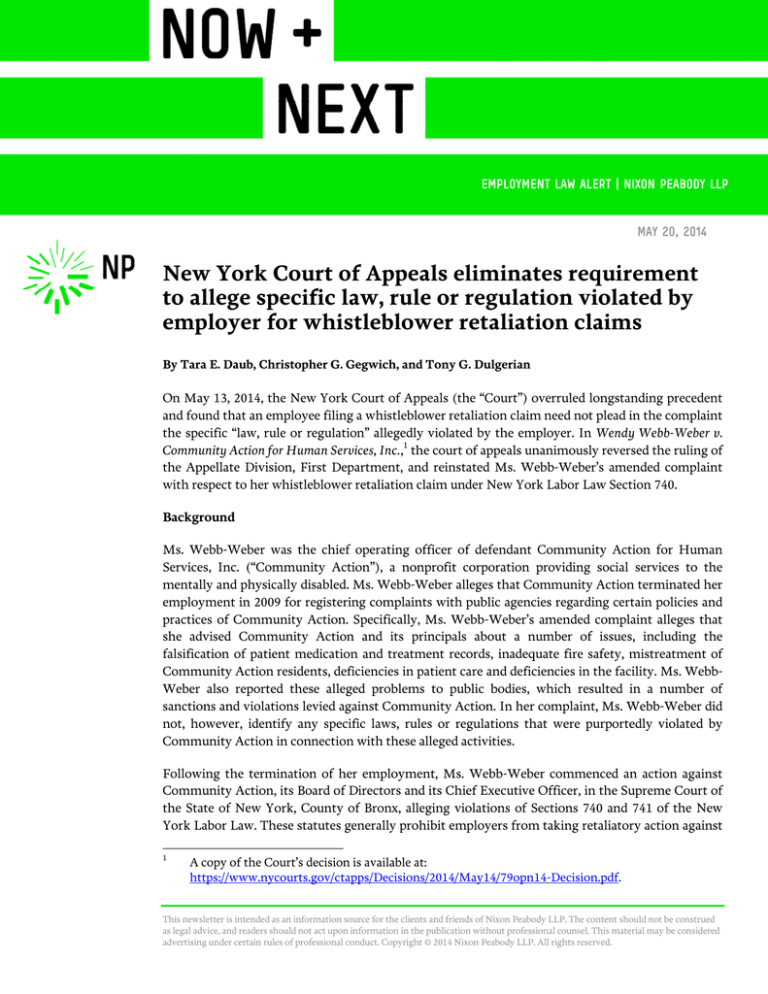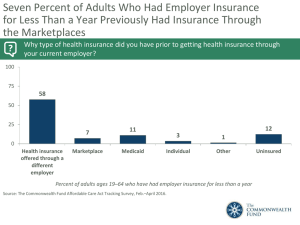
employment law alert | Nixon peabody LLP
May 20, 2014
New York Court of Appeals eliminates requirement
to allege specific law, rule or regulation violated by
employer for whistleblower retaliation claims
By Tara E. Daub, Christopher G. Gegwich, and Tony G. Dulgerian
On May 13, 2014, the New York Court of Appeals (the “Court”) overruled longstanding precedent
and found that an employee filing a whistleblower retaliation claim need not plead in the complaint
the specific “law, rule or regulation” allegedly violated by the employer. In Wendy Webb-Weber v.
Community Action for Human Services, Inc.,1 the court of appeals unanimously reversed the ruling of
the Appellate Division, First Department, and reinstated Ms. Webb-Weber’s amended complaint
with respect to her whistleblower retaliation claim under New York Labor Law Section 740.
Background
Ms. Webb-Weber was the chief operating officer of defendant Community Action for Human
Services, Inc. (“Community Action”), a nonprofit corporation providing social services to the
mentally and physically disabled. Ms. Webb-Weber alleges that Community Action terminated her
employment in 2009 for registering complaints with public agencies regarding certain policies and
practices of Community Action. Specifically, Ms. Webb-Weber’s amended complaint alleges that
she advised Community Action and its principals about a number of issues, including the
falsification of patient medication and treatment records, inadequate fire safety, mistreatment of
Community Action residents, deficiencies in patient care and deficiencies in the facility. Ms. WebbWeber also reported these alleged problems to public bodies, which resulted in a number of
sanctions and violations levied against Community Action. In her complaint, Ms. Webb-Weber did
not, however, identify any specific laws, rules or regulations that were purportedly violated by
Community Action in connection with these alleged activities.
Following the termination of her employment, Ms. Webb-Weber commenced an action against
Community Action, its Board of Directors and its Chief Executive Officer, in the Supreme Court of
the State of New York, County of Bronx, alleging violations of Sections 740 and 741 of the New
York Labor Law. These statutes generally prohibit employers from taking retaliatory action against
1
A copy of the Court’s decision is available at:
https://www.nycourts.gov/ctapps/Decisions/2014/May14/79opn14-Decision.pdf.
This newsletter is intended as an information source for the clients and friends of Nixon Peabody LLP. The content should not be construed
as legal advice, and readers should not act upon information in the publication without professional counsel. This material may be considered
advertising under certain rules of professional conduct. Copyright © 2014 Nixon Peabody LLP. All rights reserved.
employees who disclose or threaten to disclose an unlawful activity, policy or practice of the
employer to the employer or a public body. Section 740 broadly applies to all employers, while
Section 741 only applies to health care employers. These statutes also carry different burdens of
proof for the employee. Specifically, an employee pursuing a Section 740 claim must ultimately
prove that the employer actually violated a law, rule or regulation, while an employee pursuing a
Section 741 claim must merely prove that she reasonably believed, in good faith, that the employer
violated a patient care law, rule, regulation or declaratory ruling adopted pursuant to law.
Community Action and the other defendants moved to dismiss the complaint for failure to state a
cause of action because Ms. Webb-Weber failed to cite the specific law, rule or regulation allegedly
violated by Community Action, and Ms. Webb-Weber cross-moved for leave to amend her
complaint. The lower court partially granted the motion to dismiss, but left Ms. Webb-Weber’s
Labor Law claims intact. Following an appeal of the decision on the motion to dismiss, on
September 27, 2012, the Appellate Division, First Department, reversed the lower court’s decision
and dismissed Ms. Webb-Weber’s Labor Law Sections 740 and 741 claims on the grounds that she
failed to identify a particular law, rule or regulation that Community Action purportedly violated—
at the time, a necessary pleading requirement. See Webb-Weber v. Community Action for Human
Services, Inc., 98 A.D.3d 923, 924 (1st Dep’t 2012). Subsequently, Ms. Webb-Weber further appealed
the dismissal of her Labor Law Section 740 claim and abandoned her Labor Law Section 741 claim.
On appeal, Ms. Webb-Weber argued that Labor Law Section 740 does not require an employee to
allege a particular law, rule or regulation that the employer allegedly violated in the initial pleading.
The court of appeals agreed.
The Court’s analysis
In determining the scope of the pleading requirements for a Labor Law Section 740 claim, the court
of appeals relied on the plain language of the statute and found that it, on its face, does not impose a
requirement that an employee identify in the complaint the specific law, rule or regulation that the
employer purportedly violated. Additionally, the Court focused on subdivision 2(a) of the statute,
which prohibits an employer from taking retaliatory personnel action against an employee for
disclosing or threatening to disclose the employer’s “activity, policy or practice.” The Court found
that the reasonable interpretation of the statute merely requires an employee to plead the “activity,
policy or practice” of the employer, but not to cite any particular “law, rule or regulation” in the
complaint.
Ultimately, the Court found that “for pleading purposes, the complaint need not specify the actual
law, rule or regulation violated, although it must identify the particular activities, policies or
practices in which the employer allegedly engaged, so that the complaint provides the employer
with notice of the alleged complained-of conduct.” In doing so, the Court explicitly overruled
Appellate Division case law holding to the contrary. See Deshpande v. TJH Medical Services., P.C., 52
A.D.3d 648, 650 (2d Dep’t 2008), leave denied, 12 N.Y.3d 704 (2009) (reversing denial of dismissal of
Section 740 claim where “plaintiff failed to allege a violation of any law, rule, or regulation with the
requisite particularity and specificity necessary to support a cause of action under Labor Law
Section 740.”); Blumenreich v. North Shore Health System, Inc., 287 A.D.2d 529, 530 (2d Dep’t 2001)
(same); Connolly v. Macklowe Real Estate Co., 161 A.D.2d 520, 522-523 (1st Dep’t 1990) (same).
The Court noted, however, that the employee must ultimately prove that the employer actually
violated a particular law, rule or regulation, which cannot be satisfied by the employee’s own
reasonable belief that a violation occurred. At the pleadings stage, however, the employee need not
make such a particularized showing.
Implications for whistleblower litigation
This decision by the court of appeals will likely result in additional whistleblower retaliation cases
proceeding beyond the early stages of litigation, since the Court relaxed the pleading requirements
for employees and permitted vaguer allegations to withstand dismissal.
The court of appeals did make clear, however, that for an employee to ultimately prevail on a Labor
Law Section 740 cause of action the employee must be able to identify a specific law, rule or
regulation allegedly violated by the employer. To that end, the court of appeals recognized that an
employer can seek identification and specification of the law, rule or regulation allegedly violated
through the discovery process, such as a bill of particulars or other discovery device. Presumably, if
an employee cannot identify a specific law, rule or regulation during discovery, the employer
should be in a prime position to make a motion for summary judgment, arguing that the employee
has not meet the burden of proof with respect to the Labor Law Section 740 cause of action.
In the past, many employers have been able to nip a whistleblower cause of action in the bud at the
initial pleading stage where the employee failed to identify a law, rule or regulation allegedly
violated by the employer. Based on the Webb-Weber decision, however, more employers will now
be forced to engage in time consuming and costly litigation before being able to interpose a likely
successful dispositive motion.
For more information, please contact your Nixon Peabody attorney or:
— Tara E. Daub at tdaub@nixonpeabody.com, 516-832-7613 or 212-940-3046
— Christopher G. Gegwich at cgegwich@nixonpeabody.com, 516-832-7606 or 212-493-6638
— Tony G. Dulgerian at tdulgerian@nixonpeabody.com or 516-832-7520


